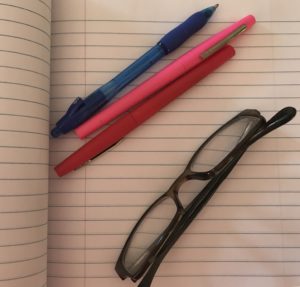
“We surprise ourselves by what we write. Writing is thinking, not thought recorded.” —Donald Murray
Far be it from me to add one more thing to your plate. Heaven knows, it’s already overflowing! However, this one-more-thing isn’t to please your administrator or a grumpy parent or the critical public. It is just for you. (Isn’t that a nice thought?!)
As a lifelong journaler and a user of a writer’s journal, I have seen up close the power of this type of reflective, regular writing to facilitate creativity and problem solving. It is therefore surprising to me that I didn’t start keeping a teaching journal until near the end of my career. But once I started, I was definitely sold. The benefits were many.
Here’s how I did it. I kept my journal on my desk at school, and the last few minutes before I left, (and any time during the day when insight struck) I jotted down thoughts, assessments of the day’s lessons, things I noticed about specific kids and whatever else came to mind. If I found that my thoughts or questions required further consideration, I took my journal home where I had the time and patience to analyze and reflect more deeply.
Often my last thoughts for the day were just a brief reflection on an encounter with a student: “In Ann’s IEP meeting today her mom was surprised when I said Ann was smart. All along, for several years, her mom and dad had been thinking that having a learning disability meant that her struggles in school were due to a lower than average intelligence! Soooo frustrating!”
Not only did this little exchange in an IEP meeting give me insight into a specific student, it also was a reminder of the importance of being clear and positive when meeting with parents. A reminder not to let the formality of meetings and the often-confusing educational dialect give parents the wrong impression.
Sometimes I wrote a reflection on a lesson that didn’t work and after identifying it I hit on an aha that I wanted to explore further: “Ugh! I did too much talking today during my minilesson. Tomorrow I’m going to actually write out a script so I don’t ramble.”
Instead of leaving feeling bad about my crummy teaching, I left with a plan for the next day. And it worked!
I also used the teaching journal to commemorate positive or funny exchanges: “You have to laugh. I walked in from hall duty this morning to John angrily accusing Reggie of wiping boogers on his desk. He was serious! Yes, I teach middle school.”
I found it helpful to keep my teaching journal nearby when grading a class set of papers. As I graded, I could quickly see, and keep track of exactly what concepts students got and what they didn’t. I also made notes on specific students and ideas for reteaching.
An especially nice way to end the day was to break down a successful lesson into its separate parts, looking not only at what I did and how I taught it but also what kind of thinking and product was being asked of the students as well as their reaction to and engagement with the lesson. Once I started breaking down successful lessons, I was better at deliberately duplicating those components in other lessons.
In his book, Discover Your Genius: How to Think Like History’s Ten Most Revolutionary Minds (HarperCollins Books, 2002), Michael J. Gelb shares the results from the 1926 study done by clinical psychologist, Catherine Cox. After analyzing the work of 300 of history’s greatest minds, Cox found that that no matter what their field, be it politics, music, the military, literature, or science, they all recorded their thinking, insights, questions and feelings by writing in personal journals or in letters to family and friends.
In her book, Building a Better Teacher: How Teaching Works (and How to Teach it to Everyone (W.W. Norton and Co, 2015), Elizabeth Green explores the process of several master teachers on several continents. One thing they had in common was how they grew their thinking about their own teaching practices. Of course, they planned before a lesson, but they also kept journals and reflected on student reactions to lessons, what went right and what went wrong.
When teaching, days go by in a flash. There are countless conversations, learnings, insights, good things, and frustrating things that happen every single day. And by the end of the day, they might all be forgotten. Taking a few minutes to consolidate your learning or thinking for the day or to celebrate a victory or to get a defeat off your chest is a productive way to put closure on today and to prepare for tomorrow.


